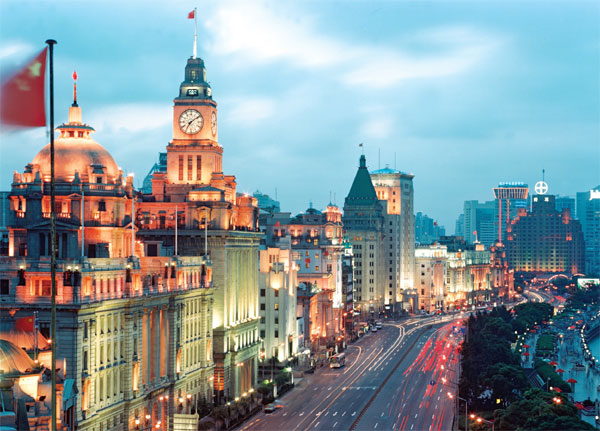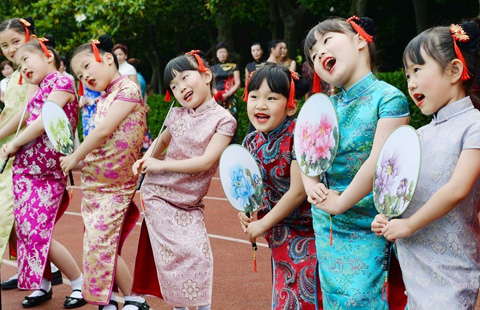The old timekeeper
Updated: 2015-05-29 11:43
By Yu Ran in Shanghai(China Daily USA)
|
||||||||
 |
|
The biggest mechanical clock in Asia, and the third-largest in the world, has kept the time on the Bund since 1928. |
"I used to be able to see People's Square and the whole of Pudong from the top of the tower, but now the views have been obscured by all the skyscrapers," he said.
In the gear room, the huge clock ticks once every two seconds. It was designed this way to reduce friction and prolong the clock's service time. As such, Wei said it feels like he operates on a slower speed at work.
The tower itself has also seen much change.
It used to chime the Westminster Quarters every 15 minutes - like every clock made in the UK - until the outbreak of the "cultural revolution" (1966-76). At that time, it began to play The East is Red, a famous Chinese revolutionary song created during Chairman Mao's era. The pattern on the clock face was also changed to one depicting golden sunflowers.
In 1986, when Queen Elizabeth II visited Shanghai, the clock resumed the mechanical chimes of the Westminster Quarters and restored the glasses on the clock face imported from Germany, at the request of the monarch.
In 2003, however, the municipal government ordered the music to be changed once again to The East is Red.
"The damage to the clock tower wrought by those changes probably cannot ever be undone, but fortunately it still stands here and reports the time for the city," said Wei.
Compared to his predecessors, Wei's time-tracking and maintenance work is easier due to a number of technological innovations.
In the past, it was necessary to have at least four or five men wind the clock springs and the process could take several hours.
Now it only takes 15 minutes as Wei installed a small motor in the heart of the clock where the gears are located. The heaviest of the three springs weighs 1,000 kilograms.
"I don't know if the clock will stop chiming for the city someday. I'm just trying to keep it working as long as I can," said Wei, whose skills are becoming increasingly niche.
Though his ambitious travel plans include getting a close look at Big Ben, as well as the clock tower in Moscow's Red Square - the world's two biggest clocks - Wei has found himself stuck in Shanghai for almost two decades.
"My biggest regret was that I didn't have time to take my family out for trips, but I will be able to do that in three years, when I retire," he said.
When asked who will replace him, Wei said Shanghai Customs must appoint somebody before 2018.
The back of the building still has some residential apartments connected to old alleyways, but the living conditions here in the first half of the century were notoriously bad.
Zhou Yuan, a local resident who grew up in the area, recalls the difficult conditions endured by her grandparents, who lived in the building for over 50 years. Their 13-square-meter apartment didn't have a private toilet or kitchen, so they had to share facilities with several neighbors.
"I remember the clock playing the Westminster Quarters and sending out loud gongs each hour. That will forever be a part of my childhood memories," said Zhou, adding that most residents have since moved out.
Now this row of foreign buildings erected before 1937 along the Bund, including the Customs House, Shanghai Municipal Trade Union Council and Shanghai Foreign Exchange Trade Center, serve as historical markers of a time when Shanghai ranked as one of the most important trading ports in the world.
"Those historical buildings on the Bund have been protected and preserved extremely well by the government, often through very difficult periods, which shows a great deal of respect for our history and culture," said Professor Zheng Shiling, honorary president of the Architectural Society of Shanghai.
In the early 1900s, the old Bund was a large international port crowded with people delivering cargo from all over the world.
"At that time, nobody noticed the extraordinary architecture created by the foreign businessmen, but only the goods and Western culture transported from across the sea," said Zheng.
Zheng said the city should not forget its unsung heroes like Wei who have dedicated years of their lives to guarding these historic relics.
yuran@chinadaily.com.cn
- Half of college students want to work in second-tier cities: Survey
- CPC publishes 'self-decoding' books for Western audience
- Capital aiming for 208 new care centers for the elderly
- Ten photos you don’t wanna miss – May 29
- Guangdong police bust huge 'ice' labs
- Patients take precedence for top researcher
Most Viewed
Editor's Picks

|

|

|

|

|

|
Today's Top News
China's most-wanted fugitive set to be extradited by US
US charges 15 Chinese nationals in college exam fraud scheme
Former US House Speaker Hastert indicted on federal charges
No one tells us what to do, Beijing says
Li: Spain a partner for new market
Foreign policy not foreign: expert
China makes splash at book fair
Brazil ready to collaborate over FIFA graft probe
US Weekly

|

|















